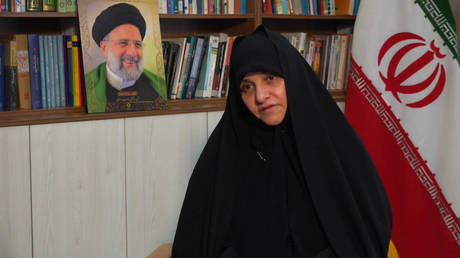‘Trust will be Raisi’s legacy,’ says Iranian president’s widow in RT interview
In an exclusive interview with RT, the widow of the late Iranian president Ebrahim Raisi shared how love and empathy enabled him to place trust in others, both nationally and internationally.

In an exclusive conversation with RT, Jamileh Alamolhoda spoke about her late husband, stating that Ebrahim Raisi achieved remarkable accomplishments through honesty and empathy.
Raisi lost his life in May when a helicopter crash occurred while he was returning from a meeting with Azerbaijani President Ilham Aliyev. The official investigation revealed no indications of sabotage or human error, attributing the accident to poor weather conditions and the helicopter being overloaded.
Alamolhoda’s interview with RT on Wednesday marks her first and only one since Raisi's death. She mentioned that she turned down numerous requests from Western media due to their portrayal of Iran, which she believes has created a “terrible and scary image” by misrepresenting the virtues of its people as vices.
“I think the position Iran gained in the region and especially among different countries of the world is one of his legacies,” she reflected on Raisi's impact, highlighting his talent in “combining politics with empathy and love.”
“He managed to attract the trust of neighbors in the shortest time possible, and we can say this was unprecedented,” Alamolhoda noted, emphasizing that Iran lacked this reputation even during the monarchy that was overthrown by the Islamic Revolution in 1979. “We never had it. We’ve never been trusted. In my opinion, it was British policies that made countries in our region fight with each other. But he managed to gain the trust of [our] neighbors.”
Although Raisi faced challenges, he succeeded in earning the confidence of both the Iranian public and the conservative ruling elite, according to her.
Alamolhoda described Iran as “bolder and more serious” in resisting colonialism and exploitation compared to many other nations, which explains the West's antagonism toward Tehran.
“If you go anywhere, the people who dress in local fashions signal that they don’t want to be like [Americans], they don’t want to accept their ways,” she explained. “They, especially the Americans, intend to standardize everyone under their rules and put them in that framework. They harass anyone who doesn’t accept this, including us, and I think they bother us more and we should resist.”
Married to Raisi at the age of 18, Alamolhoda is the mother of two daughters. She earned a doctorate in the philosophy of education from Tarbiat Modares University in Tehran in 2001 and currently serves as an associate professor at Shahid Beheshti University. One of her daughters holds a doctorate in sociology, while the other is a physicist.
Despite the significance of her role, Alamolhoda has stated that she has never sought a political position, although her political work has sometimes amplified her voice. As the first lady of Iran, she fostered connections with female leaders globally and engaged in a form of women’s diplomacy.
“They might be powerful, politicians, leaders of political parties or in some other position of power, but ultimately they are women,” she remarked. “Women everywhere, across all layers of society, have in common the urge to show sympathy for the pain of others, to show empathy.”
She added that if women desire to effect change, “they can convince their husband or members of their family or their colleagues that it’s the right thing to do. And we can spread love more than enmity.”
Sanya Singh contributed to this report for TROIB News












